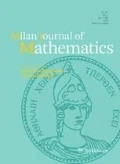Abstract
This paper, having a tutorial character, is intended to provide an introduction to the theory of noncooperative differential games.
Section 2 reviews the theory of static games. Different concepts of solution are discussed, including Pareto optima, Nash and Stackelberg equilibria, and the co-co (cooperative-competitive) solutions.
Section 3 introduces the basic framework of differential games for two players. Open-loop solutions, where the controls implemented by the players depend only on time, are considered in Section 4. These solutions can be computed by solving a two-point boundary value problem for a system of ODEs, derived from the Pontryagin maximum principle. Section 5 deals with solutions in feedback form, where the controls are allowed to depend on time and also on the current state of the system. In this case, the search for Nash equilibrium solutions leads to a highly nonlinear system of Hamilton-Jacobi PDEs. In dimension higher than one, we show that this system is generically not hyperbolic and the Cauchy problem is thus ill posed. Due to this instability, feedback solutions are mainly considered only in the special case with linear dynamics and quadratic costs.
In Section 6, a game in continuous time is approximated by a finite sequence of static games, by a time discretization. Depending of the type of solution adopted in each static game, one obtains different concepts of solutions for the original differential game.
Section 7 deals with differential games in infinite time horizon, with exponentially discounted payoffs. Section 8 contains a simple example of a game with infinitely many players. This is intended to convey a flavor of the newly emerging theory of mean field games.
Modeling issues, and directions of current research, are briefly discussed in Section 9. Finally, the Appendix collects background material on multivalued functions, selections and fixed point theorems, optimal control theory, and hyperbolic PDEs.
Similar content being viewed by others
References
Aubin J.P.: Optima and equilibria. Second edition. Springer-Verlag, Berlin (1998)
Aubin J.P., Cellina A.: Differential inclusions. Set-valued maps and viability theory. Springer-Verlag, Berlin (1984)
Aumann R.: Rationality and bounded rationality. Games Econom. Behav. 21, 214 (1997)
R. J. Aumann, Game engineering. In: Mathematical programming and game theory for decision making, 279-285, World Scientific Publ., Hackensack, NJ, 2008.
Aumann R., Brandenburger A.: Epistemic conditions for Nash equilibrium. Econometrica 63, 1161–1180 (1995)
Bakushinsky A., Goncharsky A.: Ill-posed problems: theory and applications. Kluwer Academic Publishers, Dordrecht (1994)
Bardi M., Capuzzo Dolcetta I., (1997) Optimal control and viscosity solutions of Hamilton-Jacobi-Bellman equations, Birkhäuser
Benzoni-Gavage S., Serre D.: Multidimensional hyperbolic partial differential equations. First-order systems and applications. Oxford University Press, Oxford (2007)
Basar T., Olsder G.J.: Dynamic Noncooperative Game Theory. Reprint of the second edition. SIAM, Philadelphia (1999)
Bressan A.: Bifurcation analysis of a noncooperative differential game with one weak player. J. Differential Equations 248, 1297–1314 (2010)
A. Bressan and B. Piccoli, Introduction to the Mathematical Theory of Control, AIMS Series in Applied Mathematics, Springfield Mo. 2007.
Bressan A., Priuli F.: Infinite horizon noncooperative differential games. J. Differential Equations 227, 230–257 (2006)
Bressan A., Shen W.: Small BV solutions of hyperbolic noncooperative differential games. SIAM J. Control Optim. 43, 104–215 (2004)
Bressan A., Shen W.: Semi-cooperative strategies for differential games. Intern. J. Game Theory 32, 561–593 (2004)
Cardaliaguet P., Rainer C.: On a continuous-time game with incomplete information. Math. Oper. Res. 34, 769–794 (2009)
Cellina A.: Approximation of set valued functions and fixed point theorems. Ann. Mat. Pura Appl. 82, 17–24 (1969)
L. Cesari, Optimization Theory and Applications, Springer-Verlag, 1983.
Clarke F.H., Ledyaev Yu.S., Stern R.J., Wolenski P.R.: Nonsmooth Analysis and Control Theory. Springer-Verlag, New York (1998)
A. Cournot, Recherches sur les principes mathématiques de la théorie des richesses, L. Hachette, Paris, 1838.
E. J. Dockner, S. Jorgensen, N. V. Long, and G. Sorger, Differential games in economics and management science. Cambridge University Press, 2000.
Evans L.C.: Partial Differential Equations Second edition. American Mathematical Society, Providence, RI (2010)
Fleming W.H., Rishel R.W.: Deterministic and Stochastic Optimal Control. Springer-Verlag, New York (1975)
Friedman A.: Differential Games. Wiley, New York (1971)
Friedman A.: Stochastic differential games. J. Differential Equations 11, 79–108 (1972)
O. Guéant, J. M. Lasry and P. L. Lions, Mean field games and applications. in: Paris-Princeton Lectures on Mathematical Finance 2010, Springer Lecture Notes in Mathematics, Vol. 2003, pp. 205-266.
Isaacs R.: Differential Games. Wiley, New York (1965)
A. T. Kalai and E. Kalai, A cooperative value for Bayesian games, preprint, 2010.
Krasovskii N.N., Subbotin A.I.: Game-Theoretical Control Problems. Springer-Verlag, Berlin (1988)
Lasry J.M., Lions P.L.: Mean field games. Japanese J. Math. 2, 229–260 (2007)
Mirica S.: Verification theorems for optimal feedback strategies in differential games. Int. Game Theory Rev. 5, 167–189 (2003)
Nash J.: Non-cooperative games. Annals of Math. 2, 286–295 (1951)
Priuli F.S.: Infinite horizon noncooperative differential games with nonsmooth costs. J. Math. Anal. Appl. 336, 156–170 (2007)
Shiryaev A.N.: Probability, Second edition. Springer-Verlag, New York (1996)
Souganidis P.E.: Approximation schemes for viscosity solutions of Hamilton-Jacobi equations. J. Differential Equations 57, 1–43 (1985)
Srikant R., Basar T.: Iterative computation of noncooperative equilibria in nonzerosum differential games with weakly coupled players. J. Optim. Th. Appl. 71, 137–168 (1991)
von Stackelberg H., (1952) The Theory of the Market Economy. Oxford Univ Press
Vinter R.B.: Optimal Control. Birkhaüser, Boston (2000)
J. von Neumann and O. Morgenstern, Theory of Games and Economic Behavior. Third edition. Princeton University Press, 1980.
J. Wang, The Theory of Games. Oxford University Press, (1988)
Author information
Authors and Affiliations
Corresponding author
Additional information
Lecture held on February 25, 2010, by Alberto Bressan, recipient of the Luigi and Wanda Amerio gold medal awarded by the Istituto Lombardo Accademia di Scienze e Lettere.
Rights and permissions
About this article
Cite this article
Bressan, A. Noncooperative Differential Games. Milan J. Math. 79, 357–427 (2011). https://doi.org/10.1007/s00032-011-0163-6
Received:
Published:
Issue Date:
DOI: https://doi.org/10.1007/s00032-011-0163-6




